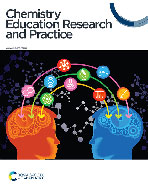Understanding covalent bonding – a scan across the Croatian education system
Abstract
This article reports on a study of understanding of key sub-topics of the curricular model of covalent bonding among participants at all levels of the chemical education system in Croatia, including among secondary school students, university students (some of whom are pre-service teachers), and secondary school chemistry teachers. The diagnostic instrument, specially designed for that purpose, was a three-tiered conceptual test. It was administered to 739 high school students, 284 university science students, and 62 secondary chemistry teachers. The study focuses on the sub-topics of bond polarity, molecular polarity, the octet rule, shapes of molecules, intermolecular forces and covalent networks. The aim is to investigate (a) the extent to which the understanding of participants from each group corresponds to curricular models, (b) which deficits in understanding can be classified as misconceptions, and which are due to lack of knowledge, and (c) the misconceptions exhibited by the participants in each category. The results highlight many cases of lack of correspondence between participants’ knowledge and scientifically accepted models, especially among students. Serious misconceptions, even among teachers, were found in each sub-topic area. Many students demonstrated lack of knowledge of concepts (rather than misconceptions). The results underline the need for better understanding of the teaching and learning demands of the six sub-topics of covalent bonding at all levels of the educational system in Croatia. Special attention needs to be paid to the sub-topics shapes of molecules and molecular polarity. This scan of understanding across the Croatian educational system, showing extensive lack of understanding of fundamental chemistry topics, reveals serious systemic problems. These findings are a call to chemistry teachers, curriculum developers and education administrators to take action in all domains and realms of pedagogical content knowledge (PCK) related to covalent bonding.


 Please wait while we load your content...
Please wait while we load your content...